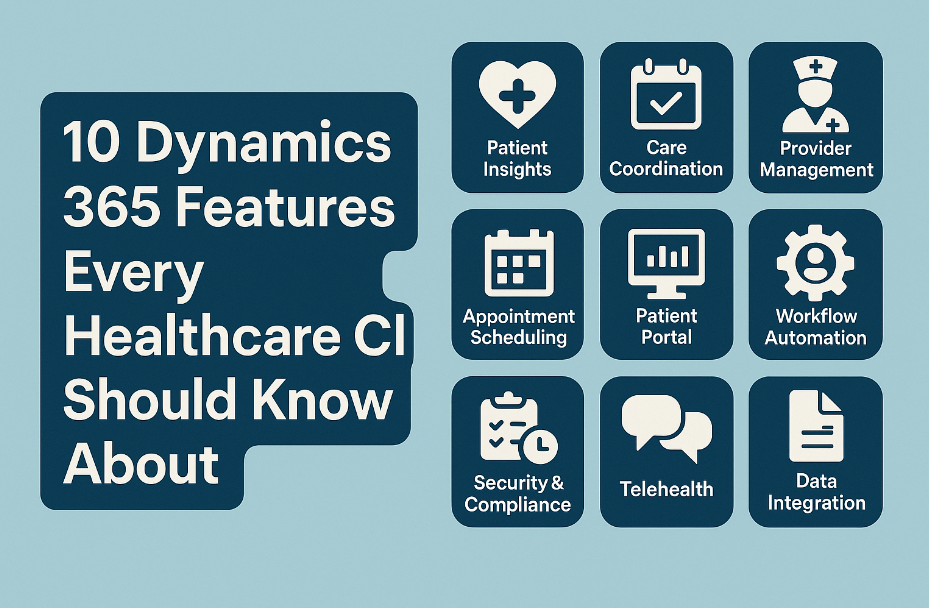The healthcare industry is under constant pressure to improve patient care, meet compliance standards, and manage rising operational costs—all while staying digitally agile. For Healthcare CIOs, choosing the right technology stack is more than an IT decision; it’s a strategic move.
Microsoft Dynamics 365 for Healthcare provides a unified platform that connects data, enhances collaboration, and streamlines patient management. From patient engagement tools to compliance-ready data security, Dynamics 365 healthcare features are designed to support both clinical and administrative needs.
Why Dynamics 365 for Healthcare Matters
Healthcare providers often deal with siloed systems—separate EHRs, billing tools, and manual reporting. This fragmentation increases costs and slows down decision-making.
With Dynamics 365 healthcare solutions, CIOs gain:
- A centralised view of patient and organisational data
- AI-powered analytics to predict patient needs
- Built-in compliance features for data security in healthcare
- Seamless integration with existing healthcare ERP software and EHR systems
10 Key Dynamics 365 Healthcare Features Every CIO Should Know
1. Unified Patient Data Management
Break data silos with Dynamics 365 healthcare management. Patient information flows seamlessly across care, billing, and operations, improving accuracy and outcomes.
2. Advanced Patient Engagement Tools
Deliver personalised care with Dynamics 365 patient engagement—from automated reminders to secure patient portals.
3. Healthcare Data Security & Compliance
Dynamics 365 data security healthcare features ensure compliance with NHS, HIPAA, GDPR, and other regulations.
4. AI-Powered Insights for Better Decisions
Predictive analytics helps identify high-risk patients, optimise resource allocation, and improve clinical performance.
5. Integration with Electronic Health Records (EHR)
Seamlessly connect with popular EHR systems for unified healthcare workflows.
6. Real-Time Collaboration Across Teams
Enable secure collaboration between clinicians, administrators, and external partners using Microsoft Teams + Dynamics 365 integration.
7. Streamlined Healthcare Operations
CIOs can standardise processes—from appointment scheduling to claims management—through Dynamics 365 healthcare ERP solutions.
8. Scalability with Dynamics 365 Business Central
While Dynamics 365 Business Central is known for finance and supply chain, it also supports healthcare by managing procurement, inventory, and budgets in real-time.
9. Cloud-Based Flexibility
The cloud-first architecture ensures healthcare organisations scale operations securely without IT overheads.
10. Future-Ready Healthcare Innovation
From AI-driven patient care to IoT integration in hospitals, Microsoft Dynamics 365 in healthcare industry is future-ready for evolving needs.
Benefits of Dynamics 365 for Healthcare CIOs
- Reduce operational costs with automation
- Gain a 360-degree view of patient care
- Improve compliance and governance
- Enable data-driven strategies for better outcomes
- Modernise legacy healthcare IT systems
Dynamics 365 Healthcare Solutions: The CIO Advantage
Every healthcare CIO faces the same challenge: balancing digital transformation with cost efficiency. With Microsoft Dynamics 365 healthcare features, decision-makers can ensure their organisations are:
- Compliant
- Efficient
- Scalable
- Patient-focused
And with Dynamics 365 Business Central integrated, CIOs can streamline both clinical and financial operations in one platform.
Final Thoughts
The role of a Healthcare CIO has never been more critical. By embracing Dynamics 365 for Healthcare, CIOs can lead their organisations towards digital maturity, improved patient care, and secure operations.
🚀 Ready to explore how Dynamics 365 can transform your healthcare organisation?
👉 Contact Dynamics Square UK today to discuss tailored healthcare ERP and CRM solutions.
newstap.co.uk



